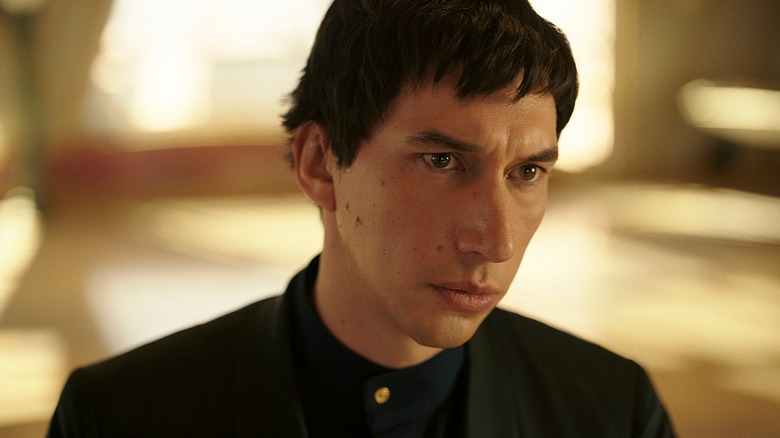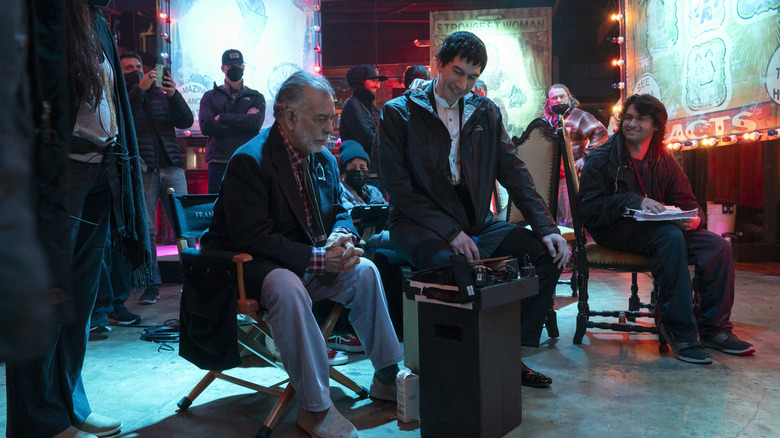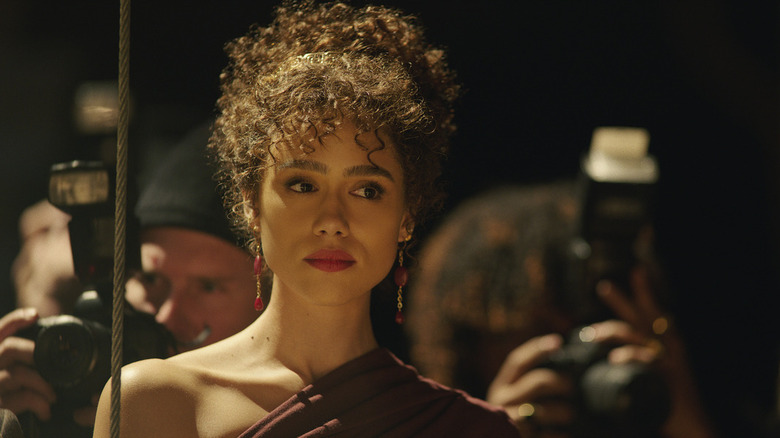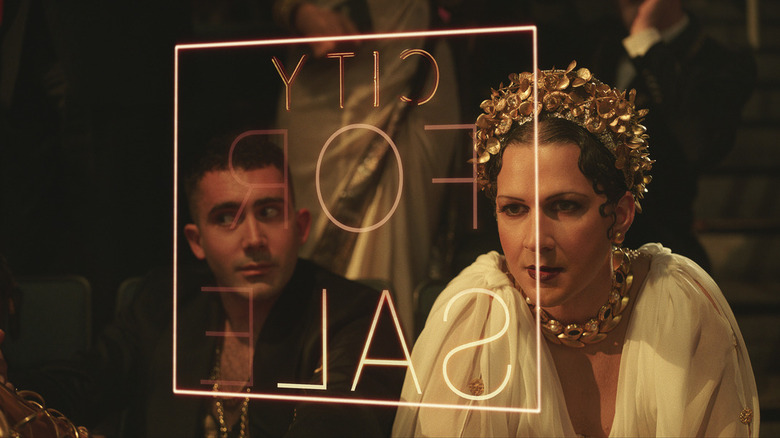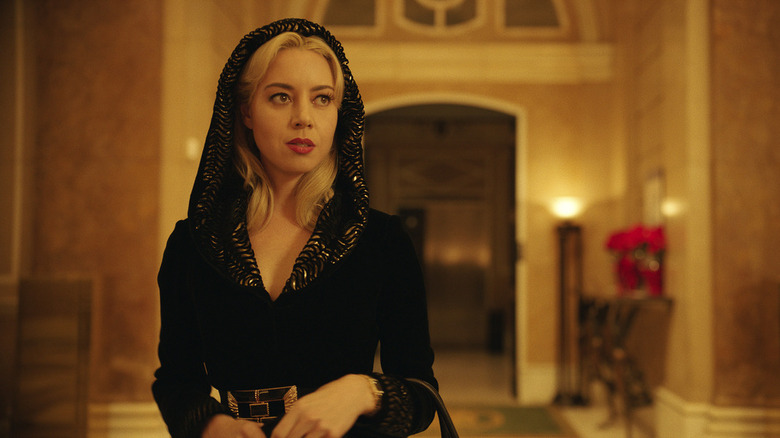5 Reasons Why Megalopolis Flopped At The Box Office
Francis Ford Coppola literally spent decades trying to get his passion project "Megalopolis" made. Eventually, the legendary director behind classics such as "The Godfather" and "Apocalypse Now" decided to hell with it and financed the epic tale himself. After all these years, the film finally hit theaters this past weekend. Unfortunately for Coppola, it was met with a very muted response from moviegoers. While there are several big qualifiers here, the film bombed on opening weekend and there is little reason to believe that things will get better in the coming weeks.
"Megalopolis" opened to an estimated $4 million domestically on just over 1,850 screens, failing to crack the top five on the charts and debuting in sixth place. It placed behind "Speak No Evil" ($4.3 million) in its third weekend and the Indian import "Devara Part 1" ($5.6 million). That opening figure was also well below already modest expectations, as the film was tracking in the $5-8 million range. Coppola's Roman Epic set in an imagined version of modern America carries a massive $120 million production budget, which doesn't account for marketing. So, to be certain, Coppola stands to lose a lot of money here.
What went wrong, exactly? Why is this different from the average blockbuster flop produced by a Hollywood studio? Why were general audiences so disinterested in Coppola's long-gestating return to the big screen? We're going to break down the biggest reasons that "Megalopolis" flopped at the box office. Let's get into it.
Megalopolis had trouble getting distribution
One of the main reasons that Coppola self-financed the massive $120 million budget for "Megalopolis" is that he wasn't willing to compromise his mission. That and other studios weren't willing to put up the money needed to bring that vision to life. That's all good and well but once that vision was put to film, it didn't make it easy for a studio partner to come on board. Coppola screened the film for virtually every major distributor in Hollywood, with all of them passing initially.
Lionsgate eventually stepped in to handle North American distribution for "Megalopolis," with the studio boarding the project in mid-June. Crucially, Lionsgate was only getting a distribution fee; Coppola was still on the hook for the marketing spend (more on that in a minute). In any event, this one didn't get the benefit of a big studio such as Warner Bros. or Universal, for example, putting its weight behind Coppola's latest. It also contributed a bit to the narrative that this wasn't an audience-friendly film, which came up a lot in the months prior to its release.
Reviews for Megalopolis were less than kind
Not that reviews always move the needle, but with a movie of this nature, reviews were arguably more crucial. Must-see buzz could have helped drive more traffic and would have helped the marketing efforts, to be certain. Unfortunately, that's not the hand "Megalopolis" was dealt. The film holds a 49% critical approval rating on Rotten Tomatoes to go with a rough 34% audience rating. Even more damning, it holds a D+ CinemaScore, suggesting word of mouth will be downright terrible in the coming weeks. So, not only did it open poorly, but it's also probably going to drop like a rock.
For what it's worth, certain critics were really on board for Coppola's big swing. /Film's Chris Evangelista called it a "beautiful mess" in his 7 out of 10 review. That may help the film gain cult status while also fueling curiosity watches on streaming/VOD in the months/years ahead; for now, though, it does little to put butts in seats. That was especially the case in the film's opening weekend, as far more audience-friendly options such as "The Wild Robot" and "Beetlejuice Beetlejuice," among others, are out there for moviegoers to choose from.
The marketing campaign was relatively small (and miscalculated)
Typically with a $120 million blockbuster, a studio will launch a massive marketing campaign. For something like Christopher Nolan's "Oppenheimer," a movie with a $100 million budget, Universal probably spent nearly an equal amount on marketing. Coppola, however, was going out-of-pocket, meaning that much money wasn't available. Instead, the film's marketing had to try and get creative with a relatively small campaign to reach a more targeted audience. That didn't exactly pan out.
Lionsgate rolled out a series of trailers, posters, TV spots, etc. — the usual stuff. However, the biggest talking point came when a "Megalopolis" trailer showcasing fake pull-quotes from reviews for other Coppola films was released online. This was very quickly flagged by the internet at large and the studio ended up having to pull the trailer. It was an unforced error that led to a lot of bad press for a movie that was already trying to overcome negative reviews and a lack of major marketing resources. This really tested the whole "No such thing as bad publicity" adage.
Francis Ford Coppola hasn't made a hit movie in a long time
There is no denying that Coppola is a master craftsman, having made some of the greatest movies of all time. Many would argue that "The Godfather" is the unquestioned greatest movie ever made. That having been said, and with all due respect, it's been a long time since Coppola has been relevant as a box office draw. The last time he had a film that made a meaningful impact commercially was almost 30 years ago with "The Rainmaker" in 1997. It pains me to say it, but Coppola's name doesn't carry a lot of weight for anyone under the age of 35, save for hardcore cinephiles.
As we've seen in the pandemic era, directors can sort of be movie stars unto themselves. That's how Nolan turned "Oppenheimer" into a Best Picture-winning hit that made nearly $1 billion and it undoubtedly contributed to the success of Tim Burton's "Beetlejuice Beetlejuice." Unfortunately, Coppola doesn't have that same kind of pull in 2024. Without a director's name that general audiences care about, what we have is a cast of actors led by Adam Driver who are certainly well-liked but not themselves capable of filling seats with their names alone, much less for a film that was always going to be a touch sell to ticket buyers, even with better reviews. A decent opening just wasn't in the cards.
Megalopolis was never, ever expected to be a hit in the first place
The biggest thing to emphasize here is that we can't judge "Megalopolis" like any other $120 million movie. I tend to be hard on Hollywood for making reckless big-budget films with very little commercial upside. The movie business is a business, after all, and it benefits everyone — viewers included — if studios are responsible. That said, we're talking about an aging filmmaker investing his personal fortune into a passion project. The only one taking any real risk here is Coppola. He's not endangering studio jobs or reputations; it's all on him. At the end of the day, he's the only one losing money here.
"There's a certain way everyone thinks a film should be, and it rubs against the grain if you have another idea," Coppola said in 2022 of his decision to fund "Megalopolis" out of his own pocket. "People can be very unaccepting but sometimes the other idea represents what's coming in the future. That is worthy of being considered."
So be it. Coppola wanted this movie to exist, and now it does. It's not dissimilar to Kevin Costner's "Horizon: An American Saga." The difference is that Costner has a four-film epic in mind and he only partially financed the endeavor. Costner also seemed to believe there was at least a little more commercial upside for his passion project. Coppola, on the other hand, appeared to be entering into this with his eyes open. Did it cost more than he planned? Almost certainly. Even so, this was a one-man undertaking and it's not fair to lump it in with other blockbuster flops. This one's a wholly unique beast.
"Megalopolis" is in theaters now.
